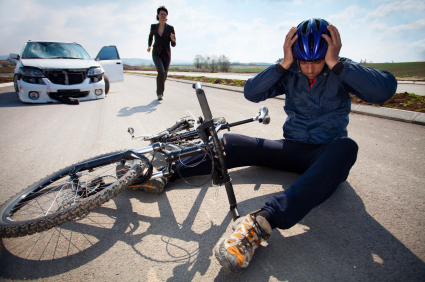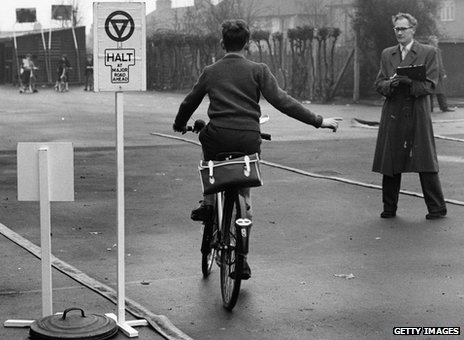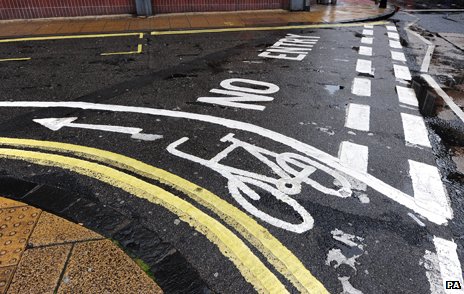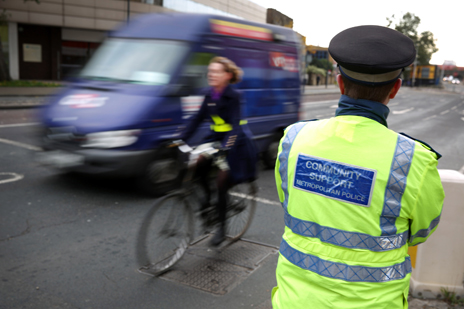
A follow up on the troubling situation in the UK as many cyclists have died lately in a rash of accidents involving vehicles, and often hit and run drivers. It’s a terrible deal for cyclists, and BBC news put out a call to concerned citizens to voice their ideas on how to make the roads safer. Below you will see some of the homegrown solutions. What do think> Moving in the right direction?
Separate traffic light for cyclists
“I am absolutely shocked that nobody suggested a network of cycle paths with its own traffic lights etc. It is time that some of the UK population drop their ‘island’ mentality and look how other places deal with cyclists e.g. Germany and the Netherlands. I stopped cycling when I moved to the UK 20 years ago because it is just too dangerous.” Anjalika Baier, Warminster, UK
Bring back cycling proficiency

Cycling proficiency, 1961
“Is the cycling proficiency test still done? I passed mine when I was 11. If not, bring it back for people of all ages and make it compulsory. Delineation of more roads to create more cycle lanes might help. Perhaps there ought to be a whole section written into the Highway Code specifically designed to combat problems with cyclists versus cars and make cyclist awareness part of the driving test.” Jane Britcher, Facebook
Make drivers cycle
“What about requiring that in order to get a driving licence, every driver has to cycle for three miles along a dual carriageway. This seems to me the best way to make drivers realise that cyclists have a right to use the road and not to be squeezed into the gutter. Most cyclists are drivers too or have been at one time but most drivers have no experience of what it’s like to cycle in traffic and don’t seem to believe that cyclists have any right to be on the road.” Pedal Pusher, London
“A real radical solution? Any person sitting a driving test should have to sit a practical test on a bike. In traffic, in an urban area and also on a country road (the problems are very different), at night, in bad weather. It might not convert them to cycling, but at least they’ll appreciate the other point of view a bit better.” Graeme Allan, Keith, Scotland
More one-way roads
A contra-flow cycle lane in York
“One way to overcome the problem would be to make city centre roads one way, where possible and provide cycle lanes which would face the oncoming traffic. Cyclists and vehicle drivers would be able to face each other and reduce confrontation.” S Bolton, Cowes, Isle of Wight
Ban overtaking on the nearside
“Ban cyclists from passing traffic on the left, i.e. under-taking, particularly near junctions. From what I’ve read a huge proportion of accidents involve vehicles turning left, which if the cyclist wasn’t there would never occur. Personally I believe I’m safest when I position myself in the middle of the lane, rather than squashed up against the curb, and in queuing traffic overtake on the outside like any other vehicle would.” David, Denmead, UK
Turning beepers
Lorries should have “beepers” when turning, like they do when reversing. Chris Hammond, Facebook
Sensors on Buses
“You missed the big one – making lorries and buses install sensors and cams for the sides of the vehicles so drivers can check for cyclists and pedestrians when turning. Also heavier penalties for drivers guilty of death by careless driving or dangerous driving. Maybe a 10-year ban from driving would make them more careful.” Phil Furneaux, Brampton, Cumbria
Design against blind spots
“More needs to be done with vehicle design. I have never understood how being in someone’s blind spot is an excuse for being maimed. A vehicle operator who is in effect moving their vehicle into space which they cannot see is clear, is simply not acceptable, especially with all the technology now available. This is where the majority of cyclists get killed and injured by lorries turning left and crushing them. Also, if a lorry driver kills or injures a fellow colleague in the depot, the HSE would be all over it, yet the same lorry driver can kill an individual on a public road (while still carrying out a job) it is no longer an issue for the HSE. It’s an absurd disconnect where we accept death and injury on our roads, yet don’t accept it in the workplace.” Rob, Essex
Compulsory high-visibility clothing

hi-vis material
“It should be law to wear some hi-vis while cycling. You cannot always blame the motorists.” TC, Walthamstow, London
“Why do people on bikes think that black is an appropriate colour to wear on the road? In my experience as a car driver, about 50% of them, in all weathers, all times of day (or night) and regardless of their behaviour or absence of other illumination, seem to think that wearing black is just fine. The other half are lit up like a Christmas tree – lights (working), fluorescent jacket, helmet light etc. If cyclists who made no effort to be seen had their bikes confiscated, it would make the rest of them think – and make the roads safer for everyone.” Al, on the road
Ban cars from small roads
“A good idea I think is if there were special roads made for cyclists like the Netherlands. Cyclists could have to pay a certain amount to travel on the special cycle roads. The toll could be very cheap. This would make road tax seem fair for cyclist and driver, help keep the bike roads/routes maintained and updated, and would be extremely cheap.” Alexander, Birmingham
Enforce traffic laws for cyclists
Police and cyclist
“[Some cyclists] ride on pavements, go through red traffic lights and most do not have insurance if they hit a vehicle. Largely the police have a tendency to ignore cycling misdemeanours and concentrate their efforts on motoring violations. When all cyclists are required and comply with traffic law where applicable and are required to have identification such as number plates, then more consideration should be given to their safety.” Bruce Spencer, Isleworth, Middlesex
Mandatory prosecution for drivers
“If any collision between a bicycle and a motor vehicle was dealt with by a mandatory prosecution for the motorist, then this would immediately cut accidents between cars and bicycles.” Steve Canning, Plymouth, Devon
Stop taxing drivers
Abolish VED. Many drivers assume that paying £20+ each year gives them the right to intimidate, maim or kill cyclists. Remove the payment, and you remove the right. Rob Holehouse, Facebook
Scrap the term “road tax”
“Let’s call it ‘environment damage fee’. That will help to clarify public roads are pay for and to be used by all legitimate vehicles, including bicycles.” Francis Chu, Singapore
Sweep the streets
cyclist and rubbish
“Cyclists often won’t use cycle tracks because they are littered with rubbish, making them hazardous. So perhaps the government could think of sweeping them to make them usable.” Hilary Tesh, Facebook
And one not very radical idea at all – respect each other
“Another radical way to improve road safety – improve the relationship between cyclists and drivers to change road behaviour. Road safety could be radically improved if there were more respect between cyclists and vehicle drivers. As a Belgian/Dutch citizen and fervent cyclist (and urban anthropologist) in London, I am often surprised by how social groups are being formed on the roads according to which mode of transport you use in this city. You are either a cyclist, or a driver – as if people never switched between transport modes. Until I moved to London two years ago, I never realised that being a cyclist was like an identity. In The Netherlands it was never anything else but a mode of transport, and literally everyone rides a bicycle, every day or occasionally.
“What surprises me is the passionate hatred that I’ve heard drivers express towards cyclists. Bus drivers shouting out of their windows that they’re going to kill us, car drivers nodding their heads in disapproval when they have to move an inch for us, taxi drivers using their klaxons as if we were putting their lives in danger, rather than the other way around. This has a far-reaching effect on the behaviour of cyclists. We start behaving like we’re fighting for our lives, protecting ourselves from the threats of death on every corner. In London, the more we have to fight, the more we are hated and the less we are understood. Both groups are moving farther away from each other, creating misunderstanding and conflict.” Line Algoed, London, United Kingdom







